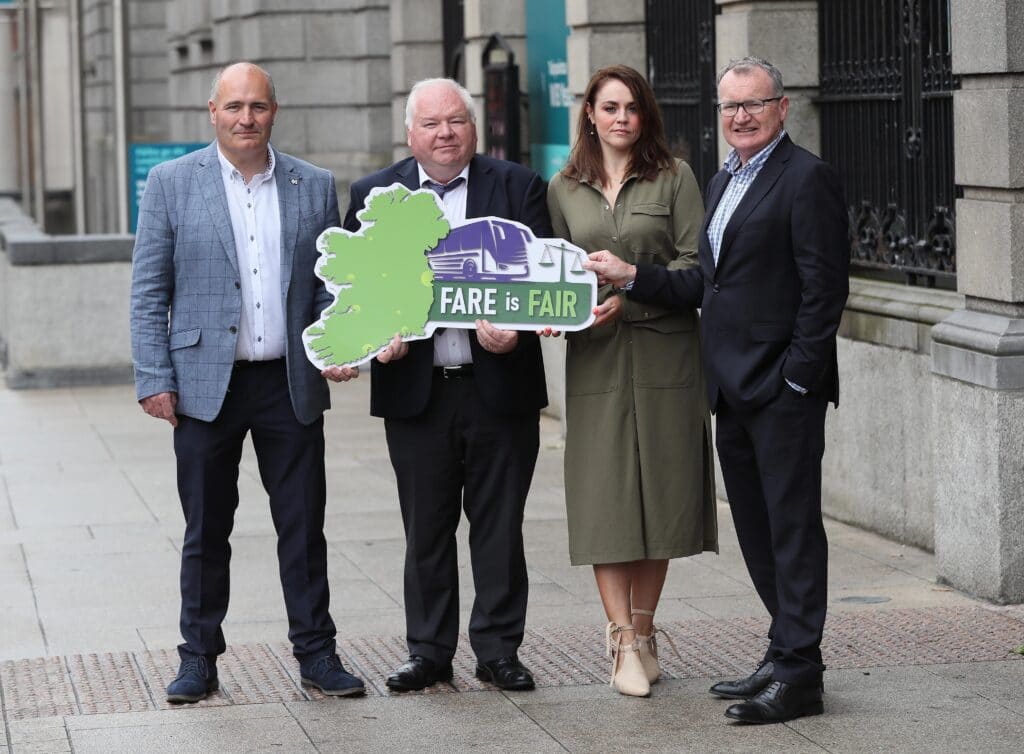The report by renowned economist Jim Power, highlights the exclusion of commercial bus operators (CBOs) from the scheme – noting that the exclusionary policy “makes no sense”. Report states by squeezing CBOs out of the market, it is the State who will incur the full cost of replacing these services.
A new report, commissioned by the Coach Tourism & Transport Council of Ireland (CTTC), and compliled by leading economist, Jim Power, has called for the immediate inclusion of commercial bus operators in the 20% fare reduction scheme that has recently been implemented across State-funded public transport services. The reduction came into effect across public transport services in the Greater Dublin Area last month and will remain in place until the end of this year. The reduction has been applied to a number of public transport services, to include; Dublin Bus, Go-Ahead Ireland, Bus Éireann and Transport for Ireland (TFI) Local Link services.
In response to the unfair Government policy, the Coach Tourism and Transport Council of Ireland has launched the ‘Fare is Fair’ campaign, which calls for an end to the fare inequity. The representative body contends that the decision to exclude CBOs from the scheme is creating a two-tier transport system, and unfairly discriminates against its thousands of passengers – the majority of whom are based in regional and rural areas, where public transport options are limited. The report – Unfair Treatment of Customers of Commercial Bus Companies in Ireland – notes that in the event that CBOs are squeezed out of the market, it is the State who will incur the full cost of replacing these services. This cost would likely pale in comparison to the funding required to include CBOs in the 20% fare reduction scheme.
Among the key findings in the report;
Approximately 300 scheduled bus services are not covered by the fare reduction measure – the vast majority of which are inter-city and inter-regional routes
Serious damage will be done to Ireland’s transport infrastructure if commercial operators are forced out of business due to unfair competition
The failure to treat the public transport system as a whole contradicts the principle of a just transition enshrined into law in the Climate Action Plan
The cost of extending the scheme to commercial bus operators amounts to less than €14 million but the economic, social and environmental benefits are incalculable
The exclusionary policy has now placed the private coach industry at a competitive disadvantage – at a time when soaring costs are already threatening to derail the industry. Inflation, labour shortages, rising insurance fees and spiraling fuel costs have put untold pressure on an industry which is still grappling with the financial repercussions of Covid-19.
Speaking on the findings, Chairperson of the Coach Tourism & Transport Council of Ireland, John Halpenny said: “The decision to exclude commercial bus operators from the 20% fare reduction scheme is one which is adversely impacting the future of Ireland’s national transport network, while raising serious questions around the fairness of such an inequitable policy. CTTC members – the majority of whom are family-owned businesses, operating on regional routes – will never be in a position to replicate the type of discounts that are being made available to passengers using PSO-funded services. This is why we took the decision to commission a crucial economic report, and launch the ‘Fare is Fair’ campaign. From the outset, the CTTC has been keen to engage proactively with Government and State Agencies to find a workable roadmap to include CBOs in the scheme. The economic report launched today, sets out a series of steps to make this a reality – steps which already incorporate existing technology, and which act as an extension to the current Leap Card system, which passengers are already familiar with. We estimate the total cost of rolling out this scheme across the private transport network to be €14 million – a sum which pales in comparison to the cost of replacing services if CBOs are forced out of the market, and a figure which is inconsequential when you consider the financial, environmental and scial repercussions of a diminished national transport network”.
“CBOs must now be included in this scheme as a matter of urgency. Fares must be fair for all”.
Pictured: John Halpenny (Chairperson, CTTC), William Martin (Martin’s Coaches), Sinead Kavanagh (Swords Express), Jim Power (Jim Power Economics)



